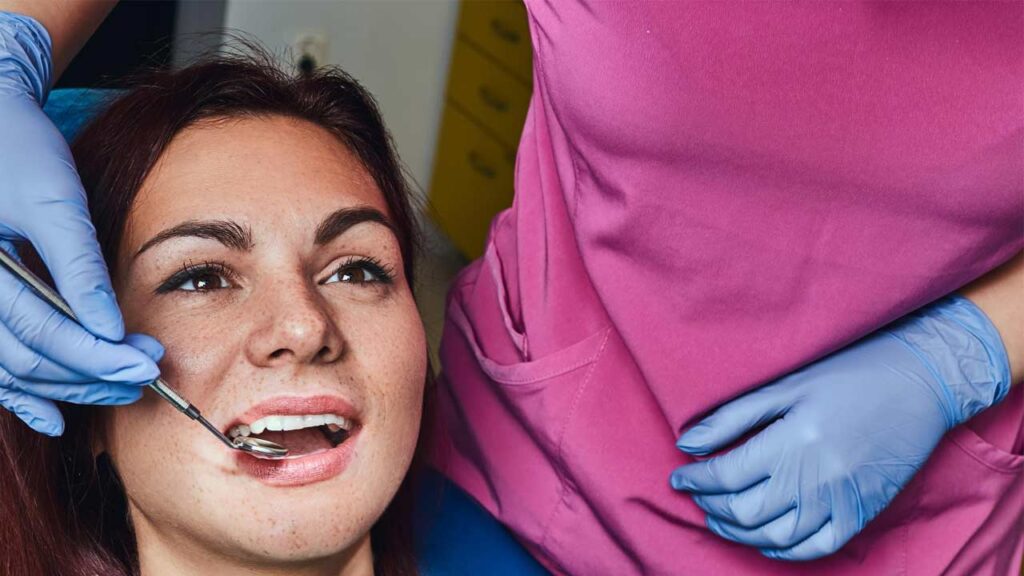Celiac disease is a common autoimmune disorder that affects millions of people worldwide. This condition is caused by an intolerance to gluten, a protein found in wheat, barley, and rye. People with celiac disease experience a range of symptoms when they consume gluten, including abdominal pain, bloating, and diarrhea. However, many people with celiac disease are unaware of the connection between this condition and their dental health. In this blog, we’ll explore the importance of dental care for people with celiac disease and the common dental issues they may face.
The connection between Celiac Disease and Dental Health
Celiac disease can have a profound impact on a person’s overall health, including oral health. People with celiac disease are at an increased risk of developing dental issues due to the malabsorption of essential nutrients, chronic inflammation, and hormonal imbalances caused by this condition. These factors can contribute to a range of dental problems, including tooth enamel deficiencies, oral lesions, delayed tooth eruption, increased tooth decay, and gum disease.
For children with celiac disease, it is especially important to instil these habits early on as they are still developing their permanent teeth. Parents should ensure that their children brush their teeth twice a day and limit sugary foods and drinks to prevent tooth decay. To manage these problems, children with celiac disease should prioritize good oral hygiene habits and seek regular dental care.
Dental Issues Commonly Experienced by People with Celiac Disease
Tooth Enamel Deficiencies: People with celiac disease may have weaker tooth enamel, which can make their teeth more prone to cavities and other forms of damage. This is because the malabsorption of nutrients caused by celiac disease can result in a lack of calcium and other minerals that are essential for healthy tooth enamel.

Oral Lesions: Some people with celiac disease may develop oral lesions, which are small sores or ulcers in the mouth. These lesions can be painful and can make it difficult to eat and speak.
Delayed Tooth Eruption: Children with celiac disease may experience delayed tooth eruption, which is when their permanent teeth do not come in as they should. This can cause crowding and other dental problems.
Increased Tooth Decay: People with celiac disease are at an increased risk of developing tooth decay due to hormonal imbalances and chronic inflammation caused by this condition.
Increased Gum Disease: People with celiac disease may also experience an increased risk of gum disease, which is an inflammation of the gums that can lead to bleeding, swelling, and tooth loss.
How Celiac Disease Affects Dental Health
Malabsorption of Nutrients: People with celiac disease may have trouble absorbing essential nutrients from their diet, which can result in a range of health problems, including dental problems.
A lack of calcium, vitamin D, and other minerals can lead to weaker tooth enamel, making teeth more prone to cavities and other forms of damage.
Chronic Inflammation: Celiac disease can cause chronic inflammation in the body, which can lead to a range of dental problems, including gum disease and oral lesions.
Hormonal Imbalances: People with celiac disease may experience hormonal imbalances, which can result in a range of dental problems, including increased tooth decay.
Medications that Affect Oral Health: Some medications used to treat the celiac disease can have negative effects on a person’s oral health. For example, some medications can cause dry mouth, which can increase the risk of tooth decay and gum disease.
Importance of Good Dental Hygiene for People with Celiac Disease
Regular Dental Check-Ups: People with celiac disease need to visit their dentist regularly for check-ups and cleanings. This will help them to identify and treat any dental problems early on before they become more serious.
Proper Brushing and Flossing Techniques: Good dental hygiene is essential for people with celiac disease. This includes brushing twice a day and flossing daily to remove plaque and bacteria from the teeth and gums.
Healthy Diet: A healthy diet that includes plenty of calcium, vitamin D, and other nutrients can help to support good dental health for people with celiac disease.
Medications for Treatment of Dental Issues: In some cases, medications may be prescribed to treat dental problems experienced by people with celiac disease. For example, fluoride treatments may be used to strengthen tooth enamel, or antibiotics may be used to treat gum disease.
healthcareDental health is an important aspect of overall health and well-being. Take control of your dental health with our top-quality dental health care products. Say goodbye to painful and inconvenient dental issues and hello to a brighter, healthier smile.
These products are designed with the latest technology and are made from premium materials, ensuring that you get the best results. Whether you’re looking for a solution for sensitive teeth, gum health, or just want to keep your smile sparkling, our dental health care products have got you covered.
Tired of hiding your smile due to yellowing, stained, or sensitive teeth?
ProDentim is here to help. This advanced formula whitens and strengthens your teeth, while also reducing sensitivity and promoting oral health. Say goodbye to expensive and painful dental treatments, and start enjoying a bright, confident smile with ProDentim.
Click Here to Try ProDentim now and see the results for yourself!
Struggling with tooth sensitivity, gum problems or bad breath?
Dentitox Pro is the solution you need. This natural, effective formula helps to clean and strengthen your teeth and gums, giving you a brighter, healthier smile. Dentitox Pro is made with the finest ingredients and is free from harmful chemicals, making it safe and gentle for everyday use. Say goodbye to pain and embarrassment, and start enjoying a confident, beautiful smile with Dentitox Pro.
Click Here to Order now and get 20% off your first purchase!
Click Here for Professional Teeth Whitening
FAQ About the Importance of Dental Care for People with Celiac Disease
What is Celiac Disease?
Celiac disease is a common autoimmune disorder that affects millions of people worldwide. It is caused by an intolerance to gluten, a protein found in wheat, barley, and rye.
What is the Connection between Celiac Disease and Dental Health?
Celiac disease can have a profound impact on a person’s overall health, including oral health. People with celiac disease are at an increased risk of developing dental issues due to the malabsorption of essential nutrients, chronic inflammation, and hormonal imbalances caused by this condition.
What are the Common Dental Issues Experienced by People with Celiac Disease?
Some common dental issues experienced by people with celiac disease include tooth enamel deficiencies, oral lesions, delayed tooth eruption, increased tooth decay, and gum disease.
How Does Celiac Disease Affect Dental Health?
Celiac disease affects dental health by causing malabsorption of essential nutrients, chronic inflammation, and hormonal imbalances. These factors can contribute to a range of dental problems.
What is the Importance of Good Dental Hygiene for People with Celiac Disease?
Good dental hygiene is important for people with celiac disease because it can help to prevent and treat dental problems. This includes regular dental check-ups, proper brushing and flossing techniques, a healthy diet, and taking any necessary medications.
How Can People with Celiac Disease Ensure Good Dental Health?
People with celiac disease can ensure good dental health by visiting their dentist regularly, practising good dental hygiene, and following a healthy diet. They should also be mindful of any medications they are taking and any potential side effects they may have on their oral health.
In conclusion, celiac disease can have a significant impact on a person’s dental health. People with celiac disease are at an increased risk of developing a range of dental problems, including tooth enamel deficiencies, oral lesions, delayed tooth eruption, increased tooth decay, and gum disease.
People with celiac disease need to prioritize their dental health by visiting their dentist regularly, practising good dental hygiene, and following a healthy diet. By taking these steps, people with celiac disease can help to protect their oral health and maintain a healthy smile.

